Citizens as the producers of environmental information
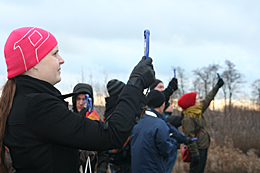
© SYKEKUVA
Citizens can actively contribute to the production of environmental information by collecting, analysing and using information pertaining to the state of the environment. With the help of SYKE ’s CitobsDB service platform, citizens’ observations can be easily collected through different websites, and the information can be flexibly turned into open datasets that can be linked to other information.
For example, the Järviwiki (Lake and Sea Wiki) online service is used to gather algae and jellyfish observations and water quality data through co-operation between nature enthusiasts and the authorities. During the abundant algae blooms of summer 2018, the Järviwiki website had as many as 24,000 visitors a day. Observations of school pupils are also gathered, for example, for winter monitoring and for water quality monitoring.
In co-operation:
Citizens, research partners, authorities.
Read more:
Turning school and workplace cafeterias into drivers of sustainable food culture
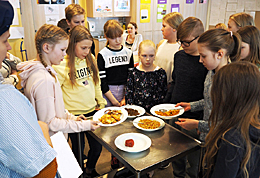
© Jyväskylä Children's Parliament
School and workplace meals have a strong foothold in Finland as supporters of healthy lifestyles. In recognition of this, SYKE has promoted sustainable dining in collaboration with food services by introducing optional vegetarian meals to three Finnish schools and helping pupils in the development of vegetarian meals. In addition to this, we have also promoted plant-based meals in our own workplace cafeteria.
Long-term menu planning and recipe development play a major role in changing people’s diets. As regards schools, it is important to facilitate pupils’involvement in the development of vegetarian meals – otherwise the food will remain uneaten.
In co-operation:
University of Tampere, The Centre for Consumer Society Research, Acadmy of Finland, schools and pupils.
Read more:
Citizens collect information on the effects of climate change on winter
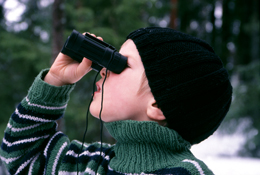
© Jutta Kuure
Citizens’ observations complement the authorities’ monitoring data on change in winters, creating a better overall picture. For example, winter monitoring involved the collection of citizens’ observations of the impacts of climate change on winter and nature in general. Participants reported information on issues such as species, snow water equivalent, the ice cover and the melting of ice in waterways.
Information collected by citizens was stored in databases, which are available to researchers. A mobile service developed by SYKE, Havaintolähetti, facilitated the collection of information. The same service was previously used for recording findings in the Lake and Sea Wiki.
In co-operation:
Nature League (Luonto-Liitto), Finnish Museum of Natural History, Helsinki Region Environmental Services Authority HSY, Suomen latu Ry
Read more:
Tips on sustainable choices from the Baltic impacts calculator
Food production accounts for about 60% of the average Finnish citizen’s eutrophication impacts on the Baltic marine environment. Wastewater effluent is also significant, accounting for a quarter of the total footprint. Devised by SYKE and Natural Resources Institute Finland (LUKE), the Baltic impacts calculator shows consumers how their choices affect inputs of nutrients into the Baltic Sea. As the first of its kind anywhere, the calculator breaks new ground by enabling everyone to measure their eutrophication footprint and act to improve the state of the sea through their consumption choices.
In co-operation
Natural Resources Institute Finland, newspaper Helsingin Sanomat, John Nurminen Foundation
Read more:
Finland’s Nature Day strengthens relationship with nature
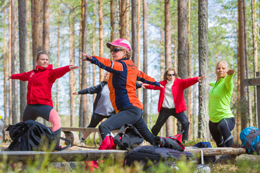
© Petri Jauhiainen
Finland’s Nature Day celebrates our unique and beautiful nature, makes people aware of the value of nature and nurtures the Finnish people’s relationship with it. This extensive cooperation network has produced numerous events around the country, enabling hundreds of thousands of citizens to participate in celebrating the Nature Day.
In 2017, Finland became the first country in the world to fly its national flag officially in honour of its natural environment. In fact, it has been proposed that Finland’s Nature Day, developed by SYKE, the Finnish Association for Nature Conservation and Metsähallitus, be established as a flag flying day.
Read more:
Climate diet to reduce personal emissions

© Saara Sivonen
The online calculator developed and maintained by SYKE enables citizens to evaluate their personal climate footprints. When your weight is known, the calculator suggests ways of starting a quick diet or engaging in a more thorough lifestyle change. The climate diet is a practical tool that has been included in campaigns and a television programme broadcast by YLE, the Finnish Broadcasting Corporation. The service has been used over 100,000 times and its English version has attracted international interest.
Read more:
School students observe the condition of the waterways
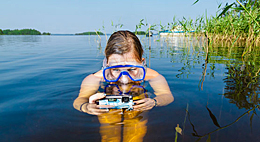
© Petri Jauhiainen
Courses offered by SYKE, together with educational institutions and students, have caused students of Rauma in Western Finland to become enthusiastic about observing and exploring the condition of waterways. In the courses, the students have been taught how to make use of open data monitoring systems provided by SYKE, and even to construct simple digital monitoring devices.
Environmental monitoring is already in the teaching programs of many other schools and a new educational model based on digital gaming is intended to be phased in throughout the country. Phenomenon-based learning is also subject to international interest.
In co-operation
Rauma lyseo high school, Luma-center of University of Turku, City of Rauma and Friends of the Selkämäri National Park (NGO)
Read more:
Citizens as significant urban actors
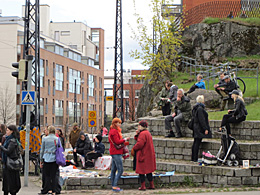
© Maija Faehnle
Digitalization has created new forms of civil activity and sharing economy for renewing communities, democracy and markets. SYKE helps the actors of different sectors adapt to change and take advantage of it.
The information produced by SYKE and the University of Helsinki helped the city of Helsinki take the civil activity of this so-called fourth sector into account when creating the city’s model of participation. For example, the administrative rule of the city requires office-holders to enable the independent activities of citizens. In addition, the concept of the fourth sector has spread to central government and many municipalities, supporting the change
In co-operation:
KatuMetro, The University of Helsinki, The Ministry of Justice, The Ministry of Finance, The Ministry of the Environment, The City of Helsinki, The City of Espoo
Read more: